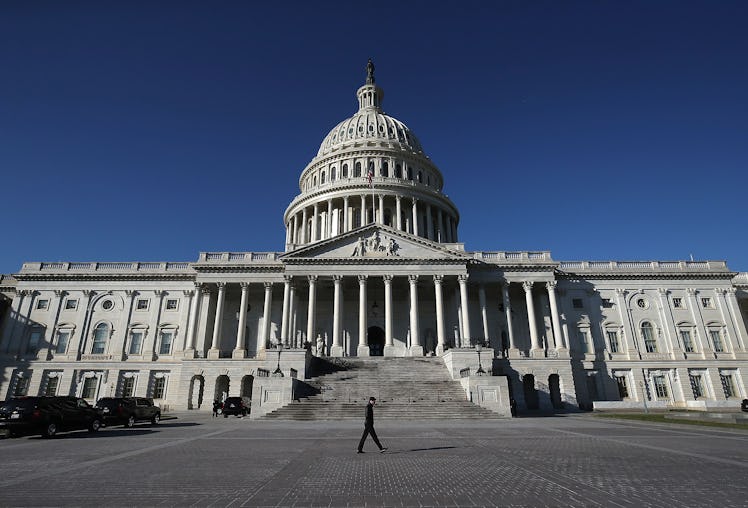
Hold Your Breath, Because Congress Is Taking The First Step To Save Net Neutrality
Remember when net neutrality rules were voted out and the internet freaked out? Well, there's been a new development in this case that's given me a glimmer of hope. After the Federal Communications Commission (FCC) voted on Dec. 14 to repeal the net neutrality rules the commission itself put into place just two years ago in 2015, a lot of people were hoping that Congress could find a way out. So can net neutrality actually be reinstated? The likelihood of it happening is fairly promising, thanks to Congress' latest move.
On Jan. 8, 2018 a Senate bill that would reverse the FCC's decision to repeal net neutrality regulation received its 30th co-sponsor. This means that the bill has the minimum number of senators supporting it to ensure that it will hit the Senate floor and go to a vote. Sen. Claire McCaskill (D-Mo.) provided the bill with the lucky number 30 when she announced her support for the bill on Twitter. In her announcement on social media, she stated,
30 is the magic number of cosponsors needed to get a#NetNeutrality vote in the full Senate. Proud to be that 30th cosponsor of@SenMarkey bill to restore free and open internet.
The bill was first introduced by Sen. Edward J. Markey (D-Mass.), who declared his intention to lead the fight to repeal the FCC's decision on Dec. 14, the same day that the decision was made. In a press release on his website, Markey reiterated the importance of net neutrality rules and announced that he and 33 other senators planned to introduce a Congressional Review Act (CRA) resolution that would undo the FCC vote. He stated in the press release,
With this CRA, Congress can correct the Commission’s misguided and partisan decision and keep the internet in the hands of the people, not big corporations. Our Republicans colleagues have a choice - be on the right side of history and stand with the American people who support net neutrality, or hold hands with the big cable and broadband companies who only want to supercharge their profits at the expense of consumers and our economy.
While we don't know how successful this latest move will be just yet, it's a pivotal first step in the process of reversing the FCC ruling. Congress has the ability to overturn the FCC's decision by passing legislation which would make net neutrality the law of the land. We don't know if internet regulation is on House of Representatives' agenda, but it's not hopeless. Before the vote, there was bipartisan outcry in Congress, with both Democrats and Republicans in both houses speaking in support of net neutrality.
The FCC's 3-2 vote to repeal net neutrality regulations on Dec. 14 ended the rules governing the internet as a utility, similar to phones. The repeal gives internet service providers (ISPs) the ability to pick and choose the content they want their customers to see and block or slow down speeds of other content they do not want their users to access as easily. Depending on the ISP, this repeal could mean companies such as Comcast and Verizon will have the ability to earn more in revenue by pushing the content they profit from the most.
Prior to the vote, there was a mass public outcry and and outpouring of phone calls to the FCC urging the commission to keep net neutrality regulations intact. The commission received a record breaking 22 million calls to their lines prior to the vote, but seemingly ignored this mass protest against repealing net neutrality. The FCC claimed that may of those calls were fake and omitted them in their final decision making process to repeal the regulations.
Of course, it isn't guaranteed that this bill will be successful in reversing the FCC ruling. But lawmakers are taking the first very critical and important steps in figuring out a way to reverse the net neutrality repeal and to do so as quickly as possible. It took just over three weeks (during the holiday season, might I add) for the bill introduced by Markey to gain the necessary support it needs to ensure it's voted on in the Senate.
So things might be looking up for all the concerned citizens that made those phone calls and fought the FCC vote until the bitter end.